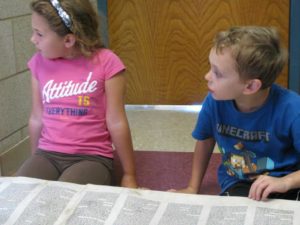We Jews have reinvented ourselves at each transition point in our history: the destruction of the Temples, the diaspora, the Enlightenment, the move to America, Zionism, the changes in modern times. At the Seder we sing, B’khol dor v’dor, in each generation we are obligated to see ourselves as if we ourselves left Egypt. Egypt has many faces. It could be the tyrant who sought to destroy us or the inclusion that threatens to absorb us. B’khol dor v’dor we are obligated to modify, to reinvent ourselves in response to bad times and good. What has kept us relevant is the ability to adjust to new realities. What has kept us alive as a people is the ability to stay true to our tradition and values.
So we’ve survived as a people for thousands of years. Why is that important? How will it help you, your children, or the world for Judaism to survive? Like all important questions, this one has many answers for each of us and somewhat different answers for any two Jews.
 Here are some of my answers to that question. I am Jewish because our story of beginnings makes us part of a universal whole before it makes us a separate and unique people; because we recall with pride, not embarrassment, that our father was a wandering Aramaen; because we use our experience in slavery not as an excuse to harm the other but as a motivation to free the other. Judaism needs to thrive because the concepts of human equality rooted in our biblical narrative and expanded by our ancient rabbis are the foundation of modern ethics and the philosophy of enlightened governments. Why be Jewish? Because Judaism is the gift we inherited from our ancestors that we can give to our children.
Here are some of my answers to that question. I am Jewish because our story of beginnings makes us part of a universal whole before it makes us a separate and unique people; because we recall with pride, not embarrassment, that our father was a wandering Aramaen; because we use our experience in slavery not as an excuse to harm the other but as a motivation to free the other. Judaism needs to thrive because the concepts of human equality rooted in our biblical narrative and expanded by our ancient rabbis are the foundation of modern ethics and the philosophy of enlightened governments. Why be Jewish? Because Judaism is the gift we inherited from our ancestors that we can give to our children.
The essence of Judaism is found in community, but Judaism is not a social club. If we are to give Judaism as a meaningful gift to our children and through them to the world, we have to give the full gift: the languages, the texts, the music, the dances, the stories, the food, the community, the obligations, the pleasures, the lights and even the darkness. In his response to the Pew report Yossi Prager calls for “intensive and immersive education so [children] understand the power and beauty of Jewish values and practices.” Our children’s task will be to mold the celebrations, the rituals, the textual interpretations to fit their time. Our task is to be sure that they have something to mold.
Looking at the demands placed on children and the opportunities open to them, it seems apparent that Day School education is the most natural means to this “intensive and immersive” education Prager advocates. It allows us to give our children the same immersion in Jewish education that we give them in their general studies. At the same time, they can participate in all the activities that enrich the after school lives of their non-Jewish peers: sports, scouts, playing an instrument and the like,and they can do that in the multicultural world that life in America encourages.
This idea was reinforced in a conversation I overheard recently. I had the privilege of dining with parents of young children considering where to send their children to school. One, a surgeon from an east coast city, asked another, an early graduate of the Talmud Torah of St Paul Day School if she had found herself at a disadvantage in her general studies when she left the day school and entered public school.
 The Day School graduate replied, “I had the best elementary school education of anyone I know. Not only did I have excellent teachers who taught me how to write, how to study, and how to observe and question, how to learn math; I studied Torah and Hebrew. From Torah I not only learned who I was, and what was expected of me, I learned how to read carefully, to analyze text, to question, and to see situations from various perspectives. From Hebrew I learned the language of our people as well as how to learn a foreign language. All that meant that when I went to 7th grade, I knew how to read and analyze literature and history, to question in science, to succeed in math, and to learn new languages. As I lived my life, I knew that I was expected to see the world from many perspectives and work to make it better.”
The Day School graduate replied, “I had the best elementary school education of anyone I know. Not only did I have excellent teachers who taught me how to write, how to study, and how to observe and question, how to learn math; I studied Torah and Hebrew. From Torah I not only learned who I was, and what was expected of me, I learned how to read carefully, to analyze text, to question, and to see situations from various perspectives. From Hebrew I learned the language of our people as well as how to learn a foreign language. All that meant that when I went to 7th grade, I knew how to read and analyze literature and history, to question in science, to succeed in math, and to learn new languages. As I lived my life, I knew that I was expected to see the world from many perspectives and work to make it better.”
Her words echoed those of many other Talmud Torah of St Paul students from those early classes to the most recent graduates whom I have talked to or heard from over the years. Not only were they well prepared to take the next academic steps in all disciplines, but they all felt that they knew who they were and where they came from, what their obligations in the world were and why.
Giving one’s children a TTSP Day School education, or any Day School education, takes a commitment of time and money and a certain willingness to live in a counterculture world. It may feel like a risk. Listen to our graduates, however, and it becomes clear that the investment of time, energy and money into a Jewish education reaps great benefits.
I have deep roots in the soil of TTSP, so I have a certain bias towards that school, but I truly believe that a TTSP Day School education anchors children to a set of values and practices that are at once thousands of years old and as new as each generation. That education not only teaches children how to learn, who they are, where they came from, and what is expected from them in the world, it provides them with the skills to act on those expectations.
Why not at least investigate this option? I’m always happy to talk about all the great things about a Day School education.
Susan Cobin is the principal of the Talmud Torah of St Paul Day School. Reach her by email at [email protected], or call 651-698-8807.

